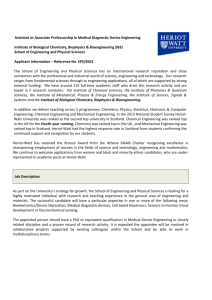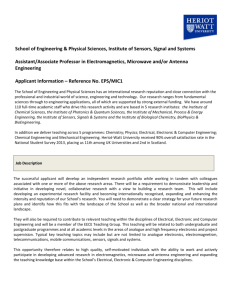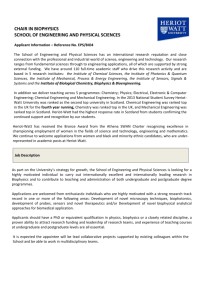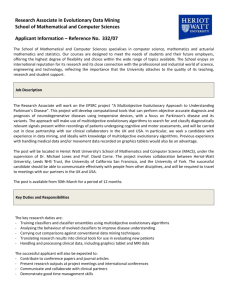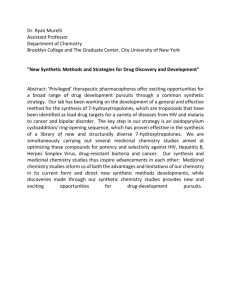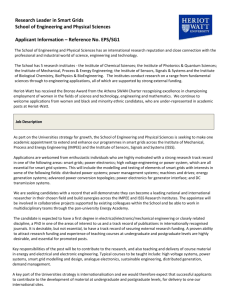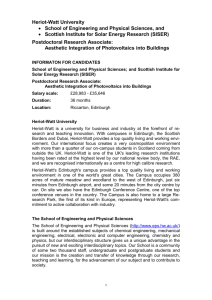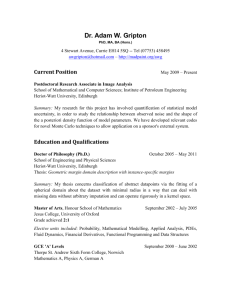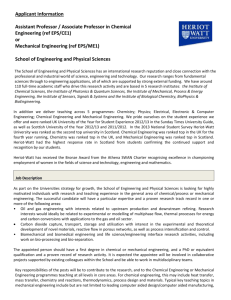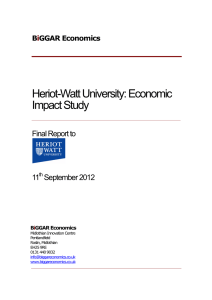2 CHAIRS AND 2 LECTURESHIPS in SIGNAL AND IMAGE
advertisement
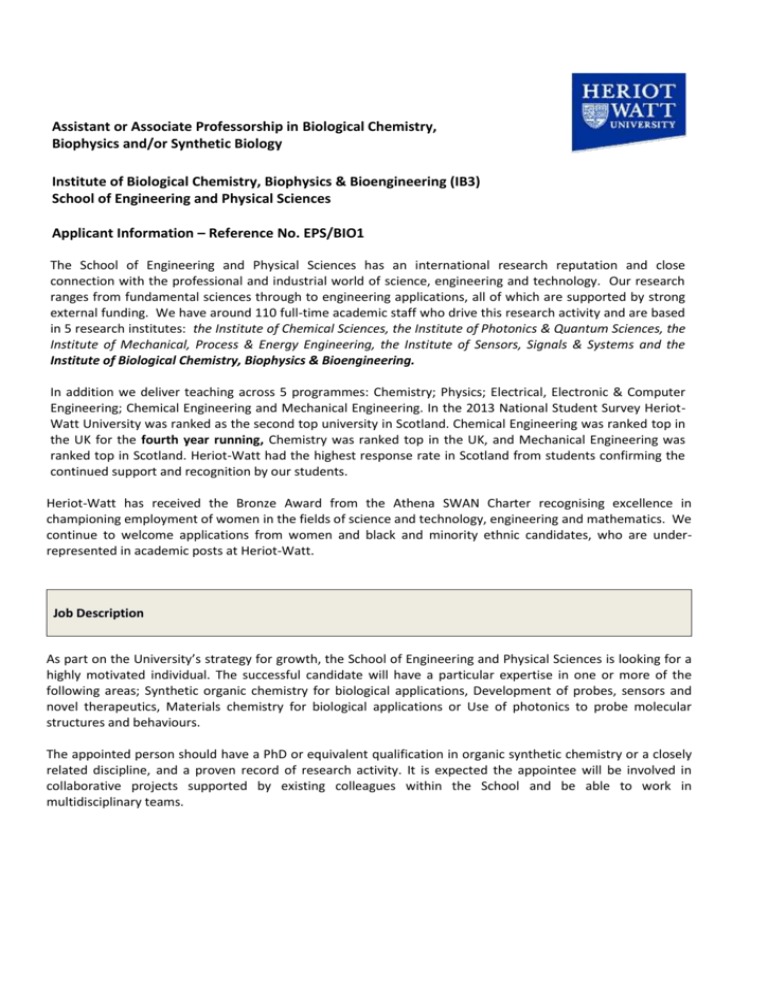
Assistant or Associate Professorship in Biological Chemistry, Biophysics and/or Synthetic Biology Institute of Biological Chemistry, Biophysics & Bioengineering (IB3) School of Engineering and Physical Sciences Applicant Information – Reference No. EPS/BIO1 The School of Engineering and Physical Sciences has an international research reputation and close connection with the professional and industrial world of science, engineering and technology. Our research ranges from fundamental sciences through to engineering applications, all of which are supported by strong external funding. We have around 110 full-time academic staff who drive this research activity and are based in 5 research institutes: the Institute of Chemical Sciences, the Institute of Photonics & Quantum Sciences, the Institute of Mechanical, Process & Energy Engineering, the Institute of Sensors, Signals & Systems and the Institute of Biological Chemistry, Biophysics & Bioengineering. In addition we deliver teaching across 5 programmes: Chemistry; Physics; Electrical, Electronic & Computer Engineering; Chemical Engineering and Mechanical Engineering. In the 2013 National Student Survey HeriotWatt University was ranked as the second top university in Scotland. Chemical Engineering was ranked top in the UK for the fourth year running, Chemistry was ranked top in the UK, and Mechanical Engineering was ranked top in Scotland. Heriot-Watt had the highest response rate in Scotland from students confirming the continued support and recognition by our students. Heriot-Watt has received the Bronze Award from the Athena SWAN Charter recognising excellence in championing employment of women in the fields of science and technology, engineering and mathematics. We continue to welcome applications from women and black and minority ethnic candidates, who are underrepresented in academic posts at Heriot-Watt. Job Description As part on the University’s strategy for growth, the School of Engineering and Physical Sciences is looking for a highly motivated individual. The successful candidate will have a particular expertise in one or more of the following areas; Synthetic organic chemistry for biological applications, Development of probes, sensors and novel therapeutics, Materials chemistry for biological applications or Use of photonics to probe molecular structures and behaviours. The appointed person should have a PhD or equivalent qualification in organic synthetic chemistry or a closely related discipline, and a proven record of research activity. It is expected the appointee will be involved in collaborative projects supported by existing colleagues within the School and be able to work in multidisciplinary teams. Key Duties and Responsibilities Work activities will vary according to the requirements of the job and individual areas of research and teaching responsibility; however, general responsibilities are typically, but not restricted to, the following: actively engaging in research and actively contributing to the University’s research profile; publicising research through the preparation and submission of journal and conference papers and participating in academic conferences; supervising students and research associates’ research work; actively pursuing research funding through the development of quality grant proposals; contributing to teaching through the delivery of lectures, tutorials and laboratories; assessing students’ work; carrying out general academic administration including student recruitment and admissions, participation on committees and exam boards, taking responsibility for key administration tasks; designing, preparing and developing teaching materials, assessment material and methods; actively developing and implementing new teaching methods; mentoring students; undertaking continuous professional development (CPD) and participating in staff development activities; managing and supervising staff; representing the institution in a professional capacity, e.g. conferences, meetings, with industrial partners, etc; establishing collaborative research and teaching links outside the university via funding councils, industry, business and public bodies. Please note that this job description is not exhaustive, and the role holder may be required to undertake other relevant duties commensurate with the grading of the post. Activities may be subject to amendment over time as the role develops and/or priorities and requirements evolve. Contractual Information Job Title: Assistant or Associate Professorship in Synthetic Biology Grade/Salary Range: 7-9 / £30,434 - £54,841 dependent on experience School/Section: EPS-IB3 Pension Scheme: USS Reporting to: Prof Rory Duncan, Head of Research Institute Annual leave: 33 days plus 9 Buildings Closed Days Duration of Post: Open-ended Sickness benefits: up to 6 months full pay, 6 months half pay Working Hours: As required to fulfil the role Start Date: As soon as possible Disclosure Scotland Requirement: N/A Person Specification This section details the attributes e.g. skills, knowledge/qualifications and competencies which are required in order to undertake the full remit of the role. Attributes Essential Education & Qualifications PhD in organic synthetic chemistry or a closely related discipline. Experience Competencies, Skills& Knowledge Strong academic record in relevant discipline Proven track record in synthetic organic chemistry for biological applications, OR development of probes, sensors and novel therapeutics, OR materials chemistry for biological applications, OR use of photonics to probe molecular structures and behaviours Excellent communication and presentation skills. Ability to work in an interdisciplinary environment. Desirable Means of Assessment Certificates Evidence or continuous publication in internationally respected peerreviewed journals. Application form, interview and peerreviewed literature Evidence of application of innovative teaching techniques. Evidence of commercialisation or exploitation of previous work. Highly ambitious Interview Capacity to be a leading national and international researcher in their field Essential Criteria – these are attributes without which a candidate would not be able to undertake the full remit of the role. Applicants who do not clearly demonstrate in their application that they possess the essential requirements will normally be eliminated at the short listing stage. Desirable Criteria – these are attributes which would be useful for the candidate to hold. When short listing, these criteria will be considered when more than one applicant meets the essential criteria. Other Relevant Information Informal inquiries should be made to Dr http://www.ib3.eps.hw.ac.uk/Colin_Rickman.html). Colin Rickman (Email: c.rickman@hw.ac.uk, Web: Shortlisted candidates will be contacted for interview four weeks after the closing date. Interviews will involve a brief presentation by the candidate followed a question and answer session with the interview panel. Interviews will preferably be held in person but for overseas candidates can be held by Skype. Application Process If you would like to be considered for either opportunity, please submit your CV, publication list and a 1 page statement of how you meet the criteria in the person specification, to research-jobs@hw.ac.uk no later than 31 October 2014. For all applications and correspondence about your application, please quote ref: EPS/ BIO1 The University is committed to equality of opportunity. Applications are particularly welcome from women and black and minority ethnic candidates, who are under-represented in academic posts at Heriot-Watt. Heriot-Watt University and Values With a history dating back to 1821, Heriot-Watt University has established a reputation for world-class teaching and practical, leading-edge research, which has made us one of the top UK universities for business and industry. We’re a vibrant, forward-looking university, well known for the quality of our degrees with employers actively seeking out our graduates. Heriot-Watt is also Scotland’s most international university with an unsurpassed international in-country presence. We deliver degree programmes to 11,800 students in 150 countries around the world, have a campus in Dubai and in Malaysia and boast the largest international student cohort in Scotland. At Heriot-Watt we’ve created an environment that nurtures innovation and leadership - where our researchers, staff and students can realise their potential and develop their ambitions. We’re proud of our collegiate atmosphere and integrated teaching and research approach which has helped to build a community of committed academics and highly motivated students. Our focus on careers delivers results and we’ve an excellent reputation for graduate employability. We have campuses in Edinburgh, the Borders, Orkney, Dubai and Malaysia where we aim to provide stimulating, supportive environments conducive to effective learning and research, and where staff and students can excel. At Heriot-Watt, we have an established set of values that help us to nurture innovation and leadership, and show our commitment to continuous improvement and development in all our activities. Our values describe our deeply held beliefs and our community spirit. They characterise not only how we are as a higher education institution but also frame how we want to be. Our values are: o o o o o Valuing and respecting everyone Pursuing excellence Pride and belonging Shaping the future Outward looking As a learning, living and working institution, we use our values as the building blocks of how we go about doing our work and how we conduct ourselves as part of Heriot-Watt University. They represent what binds us together as a University community and help us to become the best at what we do. It's key that all our staff feel part of our achievements, and our values provide your link to our success. For full details on our University please view our website, www.hw.ac.uk Heriot-Watt University is a charity registered in Scotland (SC000278).
